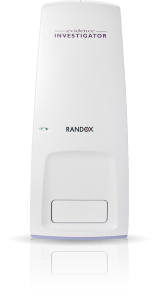Diagnosis & Prognosis of Pancreatic Cancer Patients
The Randox Pancreatic GlycoMarker Array utilises patented Biochip Technology for multiplexed glycosylated biomarker analysis, offering accessible, low cost options for cancer screening which can be readily translated to a routine clinical laboratory setting.

Biomarkers Tested
Cancer antigen 19-9 (CA19-9) is derived from an aberrant pathway during production of its normal counterpart disialyl Lewis-a is normally expressed on the epithelial surface of digestive organs, servers as a ligand for monocytes and macrophages, and aids in immunosurveillance. Epigenetic silencing of the gene for 2 → 6 sialyl transferase during early stages of carcinogenesis, leading to the abnormal synthesis and accumulation of sialyl Lewis-a (CA 19-9). Sialyl Lewis-a may also be involved in cancer invasion/metastasis as it is known to be a ligand for endothelial cell E-selectin responsible for cell adhesion.
Carcinoembryonic antigen (CEA) is an onogetal glycoprotein that is normally expressed by mucosal cells. The overexpression of CEA is observed in various malignancies. CEA is one of the most widely utilised tumor markers, with levels increasing 30%-60% in pancreatic cancer patients.
Alpha-I-Acid Glycoprotein (AAG) is an acute-phase reactant, synthesised in the liver in response to inflammation and tissue damage. AAG is a novel biomarker of pancreatic cancer. AAG expression is significantly associated with a shorter overall survival rate.
The Evidence Investigator
Meet the Evidence Investigator
The Randox Pancreatic GlycoMarker Array has been developed for the Evidence Investigator, a semi-automated benchtop immunoassay analyser.
The Randox Pancreatic GlycoMarker Array enables the simultaneous glycosylation-based detection of CA19-9, CEA and AAG from plasma samples for improved pancreatic cancer diagnosis.

Publications
Want to know more?
Contact us or visit our Cerebral Array webpage.







